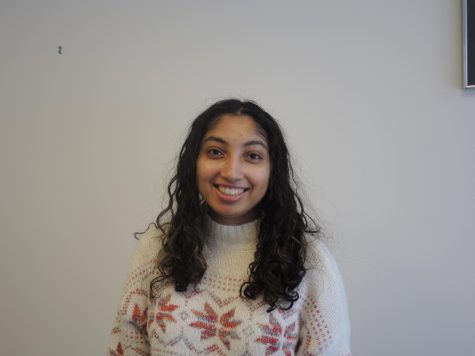Geography department holds panel discussion on global food crisis

October 27, 2022
On Tuesday, Oct. 25, members of the Macalester community gathered for a panel discussion titled “The International and Local Dimensions of the Ongoing Global Food Crisis.” The discussion was co-sponsored by the geography department, the Kofi Annan Institute for Global Citizenship, the International Development concentration and the Food, Agriculture and Society concentration.
Bill Moseley, DeWitt Wallace professor of geography and director of the Food, Agriculture and Society concentration, moderated the discussion. The talk included Sophia Murphy, the executive director of the Institute for Agriculture & Trade Policy, Metin Cakir, an associate professor of economics at the University of Minnesota and Amy Damon, a professor of economics and Latin American studies at Macalester.
Moseley began the discussion by giving a brief overview of the current global food crisis, sharing graphs and statistics regarding rates of food insecurity and contributing factors. He cited the war in Ukraine as having a particularly strong impact on global food exports, as well as COVID-19-related supply chain disruptions and issues due to climate change.
Each panelist then shared their thoughts regarding the roots of this current crisis, as well as the specific dynamics of them. Murphy discussed how the war in Ukraine illustrated the fragility of the international market, and she spoke to the importance of energy in growing and preserving food. She also talked about how climate change disrupts local food systems.
“How are we going to think about the distribution of food when local production becomes more uncertain?” Murphy said, speaking to how the world must adapt in order to combat this crisis.
Cakir focused on the economic aspects of the food crisis regarding disruptions to supply chains in the US and attributing high food prices to high market concentration. Damon then spoke to the issue of food price inflation specifically in Central and Latin America. She explained how the acquisition of land for fruit in parts of Central America has caused the displacement of small farmers, and the volatility of food prices themselves tends to hit low-income people hard.
“When [the price of] food increases by eight percent, that’s a really big deal for people who are spending half their income on it,” Damon said.
A second round of panel questioning revolved around the question of what can be done to improve this crisis, as well as alternatives to how the global food system currently works.
Murphy emphasized the importance of having a clear idea of what needs to be done to amend the global food crisis, and she reminded the audience that public interest is what needs to be defended. She also alluded to the shortcomings of market-based economics and said that something else may be required in order to address this issue.
Cakir discussed how small producers of food increase income disparities due to them often not having the tools and knowledge necessary to deal with the competitiveness of the market. He proposed the solution of keeping an eye on market prices and ensuring that they are not constantly increasing.
Damon brought up the idea of working at a local level with cooperatives, stakeholders and international chairs to strengthen supply chains. She also mentioned that offering remittances could be a good way to invest in beneficial kinds of infrastructure.
Murphy, Cakir and Damon then were given time to answer questions from the audience. In response to a question about how to disrupt the cycle of increasing wages and increasing prices, Damon acknowledged that this is a particularly tricky form of inflation that monetary policy often cannot fix. Murphy also brought up that we must ask the question of what food ought to cost in the first place.
To conclude the discussion, the panelists responded to the question of the impact of research being concentrated on certain food groups and not others. Damon emphasized how critical public research and development are in moving food systems in a different direction, as opposed to research being conducted by private entities.
“I think on a larger level, we have a decision to make,” Damon said. “What do we want our food system to look like? And that’s as we know, a really complicated question, but one that we should probably actively consider rather than passively let happen.”












